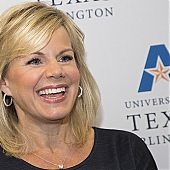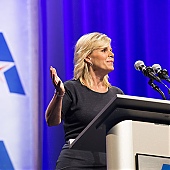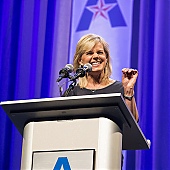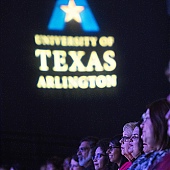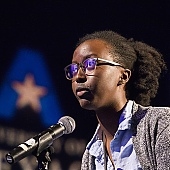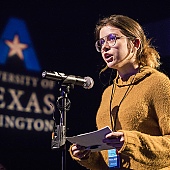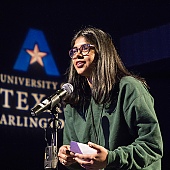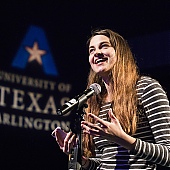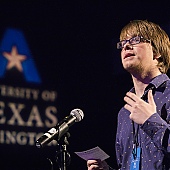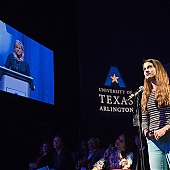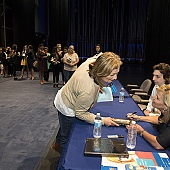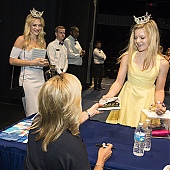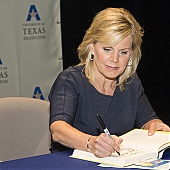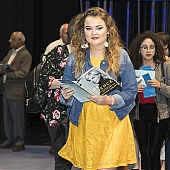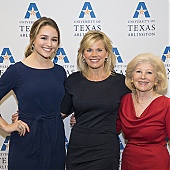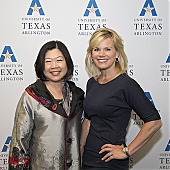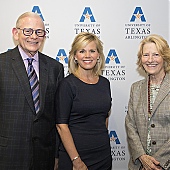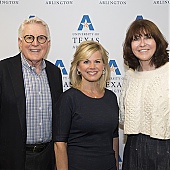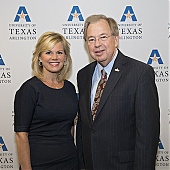COMING TO AMERICA
After fleeing war-torn Nicaragua in 1979, a young Alex del Carmen and his family arrived in Seattle, only to return home when his father was denied political asylum. They eventually made it to America, where del Carmen, deeply impacted by the brutality he witnessed as a child, has become a noted criminologist.
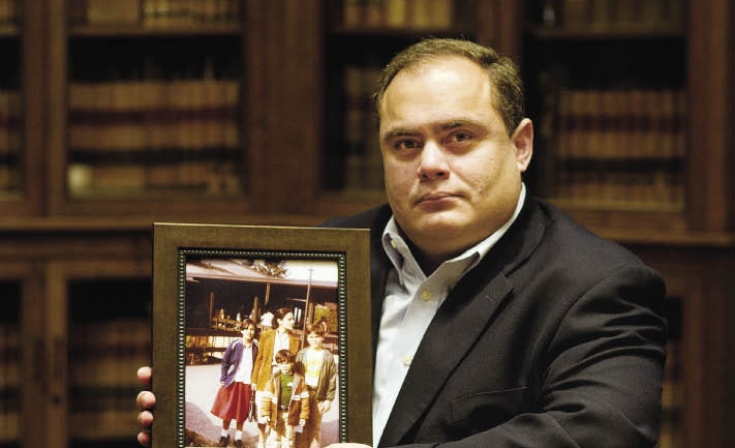
Behind the Brilliance
Three award-winning professors reveal how death, war, and a deaf orphan have motivated them to make the world a better place.
Anyone who labels college professors a dry, academic lot should delve a little further into what makes them tick. Often the research studies and scholarly pursuits of these great minds are driven by something more elemental than the need to learn, by passions born of key events—sometimes tragic, sometimes heartening.
In the case of UT Arlington’s Alejandro del Carmen, it was the brutality of war. Beth Mancini endured the death of both parents at a young age. Larry Watson worked in adoption for years, becoming closely involved in a case before teaching and publishing papers on the subject. These experiences shaped their lives and drive their quest for a better world.
ALEJANDRO DEL CARMEN — A FIGHTING CHANCE
Dr. del Carmen was 10 when war ignited in him a passion for understanding evil in order to fight it. He was born in a small Nicaraguan town worlds away from UT Arlington’s Criminology and Criminal Justice Department, which he has chaired since 2006.
Jinotepe sits inland about 40 kilometers outside the capital city of Managua. The Catholic church in the plaza was a part of daily life. “My alarm clock was the bells of the church at 7 a.m.,” he says. His father was an architect, and the family was involved in the coffee industry in a country the Somoza regime had ruled since 1936.
Life was comfortable until the civil war began in 1977. As a boy, del Carmen remembers sitting in the living area, his mother cutting his hair, and hearing tanks roll into the neighborhood. “It soon began to dawn on me that my life was going to change dramatically.”
First there were regular trips to hide underneath the bathroom sink when the airplanes came. Then there were the smells, the flames, the screams of the dying. After the Sandinista rebels commandeered the church, the bells would ring all night, supplemented by loudspeakers broadcasting propaganda, including the message that the rebels intended to “kill the bourgeois,” and that meant people like the del Carmens.
Beneath the ever-present fear were other, more portentous thoughts. “For me there was a fascination with why people would elevate themselves to that level of hatred for each other. I didn’t really understand how I was going to manifest that in my life. I’d gone from leading a sheltered life to discovering there was much evil in the world.”
A few days before the communist regime took the country, del Carmen’s father gave up on his optimism (most Nicaraguans had assumed the United States, which had supported the Somoza regime for 40 years, would intervene) and decided to get out. For part of the journey to the Managua airport, he tied a handkerchief to the car’s antenna, explaining, “That way they won’t shoot at us. They’ll know we’re civilians.”
In Managua, visas in hand, the del Carmens were delayed by barricades set up by both the Sandinistas and the government soldiers. Crossing the Sandinista side, the smell of dead bodies filled the air. “They were everywhere; there were bodies in the middle of the streets. I remember being surprised at how swollen a body gets outside after a few days.”
“You go back to a memory and realize you go back to a nightmare. Communism affects every moment, every second of your life.”
The family finally made it and boarded a packed, decrepit aircraft bound for Guatemala. At age 11, Alejandro was leaving the only country he’d ever known, with only one piece of luggage. The family eventually reached Seattle, where the father had a job with an architecture firm and applied for political asylum.
The relief was short-lived. The U.S. government rejected the del Carmens’ application, and they returned to a very different Nicaragua in 1980. The communist regime was in control.
“You go back to a memory and realize you go back to a nightmare. Communism affects every moment, every second of your life.”
Groups roaming the neighborhood would spy on families, questioning their comings and goings. When the father put up a Christmas tree, he was ordered to take it down because it was a symbol of capitalism. Alejandro told his father to defy the order, and the tree stayed up.
Finally, the family’s luck changed. Alejandro found in his grandmother’s effects an envelope with his father’s name on it that bore the U.S. embassy seal. The grandmother, who had lived in the United States, had registered her son, Alejandro’s dad, as an American born in Nicaragua, so they were free to live in America. The family settled in Huntsville, Ala.
Alejandro’s father wanted him to become an architect, but that first criminology class changed everything. “My eyes really opened,” del Carmen says. “I got to learn about why people do what they do.” This was where he could help, where he could “give something to the world for the betterment of humanity.”
He completed three degrees, including his doctorate, and eventually landed in Texas, securing tenure three years after arriving at UT Arlington. His research interests include law enforcement, crime prevention, and corrections. He has written a book on racial profiling, has been a police instructor throughout Texas, and has received numerous teaching and community service awards.
Beyond his passion for understanding and fighting hatred, del Carmen has no illusions that the American justice system is perfect. “But it’s important to recognize that it is the best system in the world, and the alternative really stinks. I’ve lived it.”
WOMAN ON A MISSION
Beth Mancini has devoted much of her life to researching and improving CPR techniques. When she was a teenager, her father died of cardiac arrest and her mother of complications from cardiac surgery.
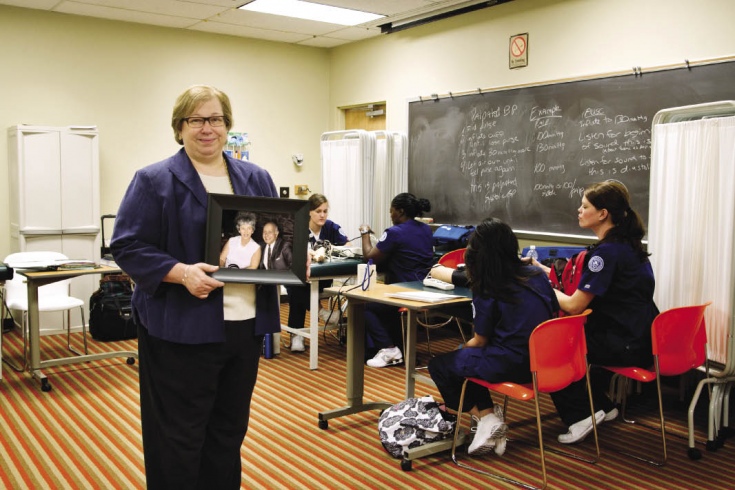
BETH MANCINI — HEART OF THE MATTER
Dr. Mancini leads the globe-trotting life of an international expert. She checks off some of the places she went last year: Japan, Australia, Hong Kong, London, Canada, Chicago, Miami.
Her mission is serious. The College of Nursing associate dean helps establish worldwide guidelines and set public policy for teaching and practicing CPR. She wants to see the lifesaving technique become common knowledge. She also teaches classes, helps stage CPR-related events, and does research.
Her relentless devotion derives from two childhood tragedies. When she was 16, her father died of sudden cardiac arrest. A year later, her mother died after complications of cardiac surgery. Though decades have passed, Mancini still tears up when she talks about what drives her. Inside, she says, she is still that teenager who lost her parents.
“If I had known then what I know today, perhaps my parents would still be alive.”
One message she wants to spread is that some CPR, even with less than perfect technique, is better than no CPR. For example, if someone suffers cardiac arrest in a public place, “if you can get a bystander to do CPR, the survival rate more than doubles.”
Mancini has helped develop accessible kits for learning the lifesaving practice; the American Heart Association distributes them. The implications of her work spread into routine CPR instruction worldwide. Remember taking a class years ago when you had to sit through a lecture on how to have a healthy heart?
“If I had known then what I know today, perhaps my parents would still be alive.”
“Some of our research indicated that we needed to simplify what we taught in CPR classes and focus on the skills of CPR,” she says. “What we didn’t spend enough time doing was teaching how to push and blow.”
Mancini, a fellow of the National League for Nursing’s prestigious Academy of Nursing Education, began her career as a staff nurse in 1976 in Rhode Island. A decade later, she had a master’s degree in nursing administration and was director of emergency services at Parkland Health and Hospital System in Dallas. Before she earned her Ph.D. in public and urban affairs at UT Arlington, she was vice president and then senior vice president of nursing administration at Parkland. She chose public and urban affairs for her doctorate because she wanted to reach as many people as possible through advocacy and public policy while still teaching.
“If I can help save even one more life by increasing the number of people with the confidence and skills to step up in an emergency and say, ‘I know CPR, I’ll do this,’ then it’s worth it.”
CARING SOUL
Amy, a tiny, deaf orphan, was destined for a life on the streets of China until Larry Watson found her an adoptive home. Now 17 and thriving at the Texas School for the Deaf, Amy fuels Watson’s passion for changing adoption policy.
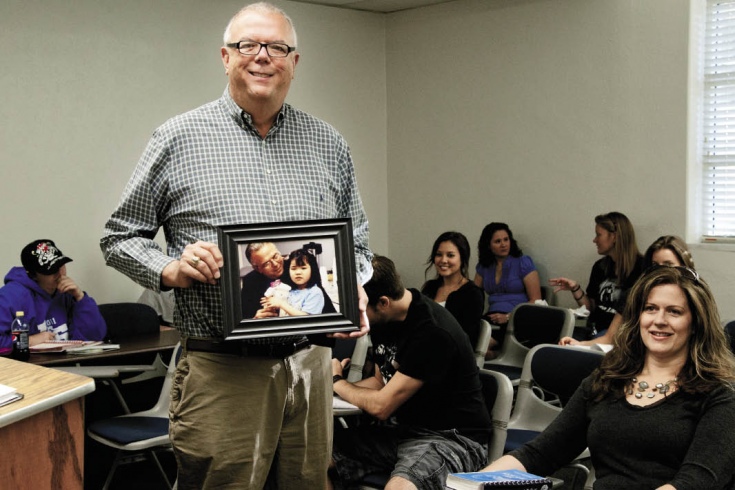
LARRY WATSON — HEARING A SILENT CALL
That day in China when he met Amy, a tiny, deaf orphan destined for a life on the streets, unwanted and unloved, changed Dr. Watson’s life. “That little girl just took me over,” says the social work assistant professor and Distinguished Alumnus.
Watson, who holds master’s and doctoral degrees from UT Arlington, had every reason to be jaded or at least matter-of-fact about kids in Amy’s situation. He had spent years at Methodist Mission Home in San Antonio, an adoption agency and vocational rehabilitation center, serving as president of the organization from 1994 to 2000 after going to work there in 1986. By the time he met Amy in the late 1990s, he’d seen thousands of children who needed homes.
A deaf child in a Chinese orphanage has almost no chance of adoption, and agencies tend to be filled with little girls because of China’s one-child policy (parents want to keep boys). At 15 or 16, Amy would likely be put on the streets to fend for herself.
Watson continued his trip, but not before Amy signed her name to him, and then someone took a photo of the two of them signing it together. He showed the picture to the woman in charge of vocational rehab at Methodist Mission Home. As he tells it, she took one look and said, “I’m going to adopt that baby.”
Theresa Johnson laughs and remembers it a little differently: “Larry’s words were, ‘You know a lot of deaf people, surely you can find a family for her.’ ”
Johnson put out feelers but “would go home and just feel terrible” about Amy. Johnson’s birth daughter was 25, and Johnson was 45. “It was crazy,” but adopting Amy “was the right thing to do, and it all fell into place.”
That was 1999. Amy now lives in Austin with Johnson and is a straight-A student at the Texas School for the Deaf doing college-level math at age 17.
Watson, inspired by his career at the mission and moved by his relationship with Amy, shifted to public policy to cut a wider swath in the adoption field. He earned his Ph.D. in public administration in 2007 and applies his expertise by teaching and working to change adoption policy. He has published a paper favoring open adoption as a result of his years watching adoptees struggle to learn who they are.
He stays in touch with Amy, and Johnson says he has been assertive in helping ensure Amy gets what she needs. After all, he saw to it that the little girl destined for the streets has a home in Texas today.
